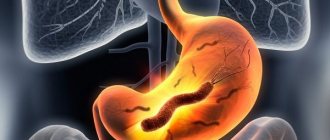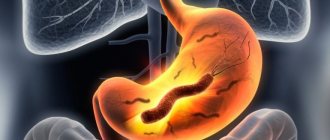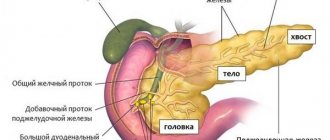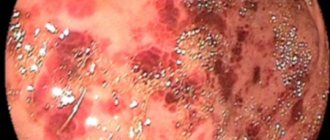What medications can you take for gastritis?
Drug treatment of gastritis is one of the most effective methods. Modern pharmaceuticals offer a wide selection of medicines that can quickly cope with the disease and eliminate all signs of gastritis and symptoms of inflammation. Therefore, let's look at what pills you can take for this disease.
Tablets for gastritis are divided into the following groups:
- antacids;
- antisecretory drugs;
- antibiotics;
- bismuth preparations;
- dopamine receptor blockers.
Each group of drugs includes medications with proven effectiveness.
As an additional drug treatment, if your stomach hurts badly, you can use painkillers, anti-inflammatory drugs, as well as medications that eliminate symptoms such as heartburn, nausea, and vomiting.
It is important not to forget that if you do not follow the diet and other recommendations of the gastroenterologist, even the best pills will not give the desired result.
Below is a list of tablets that are recommended to be taken for gastritis.
Side effects of taking antacids for gastritis
Side effects from taking antacids may include the following: diarrhea, belching, constipation. They largely depend on the drug the person is taking. Absorbed antacids lead to the so-called acid rebound.
The body, in which acidity is sharply reduced, resists this and increases it even more. In addition, taking absorbable antacids increases the production of carbon dioxide, which stretches the walls of the stomach and causes gastroesophageal reflux.
If the drug contains calcium, this can cause constipation, nausea and vomiting. Frequent use of such medications leads to the formation of kidney stones. Antacids with magnesium in their composition help to thin the stool and, if taken for a long time, can cause diarrhea, as well as problems with the kidneys.
When aluminum is present in antacids, there is a risk of constipation. In addition, there is a risk of brain inflammation, and bone tissue may lose its strength. It is not recommended to take antacids with other medications, as they can reduce their absorption.
Sources:
- https://www.kp.ru/guide/lekarstvo-ot-gastrita.html
- https://www.gastroscan.ru/handbook/121/736
- https://www.ayzdorov.ru/lechenie_yazvi_antaciti.php
- https://ecosafety.ru/ru/pacientam/vrachi/gastroenterolog/gastrit/
- https://vapteke.ru/articles/59
- https://gastritinform.ru/progastrit.info/lechenie-gastrita-s-ponizhennoy-kislotnostyu/
- https://zhivot.info/drugie-zabolevaniya-zhkt/ponizhennaya-kislotnost-zheludka
Antacids
To treat gastritis with high acidity, tablets are prescribed that have an antacid effect. These effective drugs reduce the manifestations of the disease, help with heartburn and gastritis. Taking medications on an empty stomach gives a short-term effect, and using after meals increases the duration of action to 4 hours.
Common drug names:
These tablets have the ability to reduce the effects of hydrochloric acid. Therefore, they are often used for stomach ulcers. In addition, they prevent damage to the mucosa under the influence of various factors.
Maalox
The drug is prescribed for the treatment of gastritis of any type. It should be taken after meals. Typically, 1-2 tablets are recommended for adults. First, you need to chew them well, and then wait until they completely dissolve in your mouth.
Gastal
In addition to normalizing acidity, Gastal eliminates symptoms such as pain, heartburn, and a feeling of fullness in the stomach. Medicine refers to drugs that do not treat the cause of the disease, but only reduce its manifestations. The tablet cannot be chewed; it is placed under the tongue and slowly dissolved.
Alumag
Alumag contains useful microelements. It increases the production of mucus, which protects the mucous membrane from destruction. The effect of the drug is observed a few seconds after administration and lasts for 4 hours.
Rennie
The drug is prescribed for the treatment of gastritis with high acidity. To eliminate symptoms, take 2 tablets, which must be thoroughly dissolved. The course of treatment is prescribed only by a specialist.
How to treat gastritis of the stomach
What medications do doctors indicate in their prescriptions to cure gastritis with high acidity? You need to know that there is no universal cure for gastritis. A specialist should prescribe drugs, taking into account an integrated approach, the expected effect on the cause of the disease and the patient’s sensitivity to such substances. Familiarize yourself with the mechanism of action and the names of medications that help cure the disease.
Treatment of gastritis with high acidity with medications
One of the main medical methods of combating such a disease is eradication therapy - a set of measures aimed at eliminating the bacteria that cause the disease. In this case, two types of antibacterial drugs are prescribed. For example, a patient needs to take Amoxicillin - 1 g (or Metronidazole - 500 mg) and Clarithromycin - 500 mg twice a day for two weeks.
It must be remembered that although antibiotics are quickly absorbed from the blood into the gastric mucosa, effectively eliminating the infection there, they can also have a negative effect. Often such drugs cause nausea, diarrhea, and skin rashes, so it is important to undergo treatment under the supervision of a specialist. At the same time, the doctor will prescribe other medications that will reduce the production of hydrochloric acid, neutralize its effect on the gastric mucosa, and will protectively coat the inner surface of the organ and relieve its spasms.
Proton pump inhibitors
This group of drugs is an effective cure for gastritis with high acidity, because their use reduces the production of hydrochloric acid in the stomach. As a result, damage to the mucous membrane of the organ is stopped, but such substances can also cause side effects - headaches, defecation disorders, skin rashes. As a cure for gastritis of the stomach, patients are often prescribed a weekly course of the following proton pump inhibitors (taken twice a day):
- Esomeprazole, Omeprazole – 20 mg each;
- Lansoprazole – 30 mg;
- Pantoprazole should be taken 40 mg.
Antacids for gastritis with high acidity
Drugs from this group of medications will create a protective film on the inner surface of the stomach, compensating for the insufficient protection of the organ from acid and relieving the exacerbation of gastritis, but when prescribing, their possible side effects must be taken into account. Thus, medications containing bismuth salts: Vikalin, De-Nol, Gastro-Norm, etc. can cause nausea in the patient, and sometimes there is a urge to have frequent bowel movements. These drugs have contraindications for use: childhood, pregnancy, lactation, kidney failure.
- Myocardial hypertrophy - signs and symptoms. Treatment of hypertrophic cardiomyopathy of the left ventricle of the heart
- Leeks - benefits and harm, recipes for healthy dishes with photos
- How to gain followers on Instagram without cheating. How to increase the number of live subscribers for free
Pharmacies offer antacids in the form of suspensions, gels, capsules, and tablets with a pleasant taste. Drink them after meals and before bed. The following drugs are often used as a cure for ulcers and gastritis:
- Maalox, Almagel - contain a combination of aluminum and magnesium hydroxides to provide maximum therapeutic effect;
- Phosphalugel - contains aluminum phosphate.
Histamine receptor blockers
How do these medications help against gastritis with high acidity? The active ingredients of such medications stop the spread of hydrochloric acid, which helps restore the gastric mucosa and reduces pain. Compared to proton pump inhibitors, this group of drugs is less effective, and the course of treatment is longer: from 2 to 4 weeks, 2 tablets per day. These medications include:
- Ranitidine;
- Telfast;
- Cesera et al.
Antispasmodic tablets for gastritis of the stomach
Such drugs affect the smooth muscle tissue of this organ and improve blood flow in its walls. As a component of the treatment regimen, they are recommended because of their ability to quickly relieve an attack of pain, but you should not drink such tablets uncontrollably - this can even cause cardiac arrest and nervous system disorders. Antispasmodics that help with gastritis include:
- myotropic drugs acting on the muscles of the stomach: No-shpa, Drotaverine, Papaverine, etc.;
- neurotropic drugs or anticholinergics, relieve spasms and reduce acidity: Aprofen, Difacil, Buscopan, etc.
Folk remedies for gastritis with high acidity
Often at home, sodium bicarbonate - baking soda - is used as a medicine for the stomach. After taking it, the acid in the stomach is quickly neutralized, but the effect of this drug is short-lived, and frequent use will be harmful. It is better to use medicinal plants or other natural pharmacy products to eliminate the unpleasant symptoms of the disease.
Herbs for gastritis
Many medicinal plants are used as a cure for gastritis with high acidity. Herbal teas, infusions and decoctions are prepared from them, which are then taken to mitigate the inflammatory process. The use of the following herbs for gastritis gives good results:
- chamomile;
- St. John's wort;
- calendula;
- nettle;
- celandine (taken in small doses - the plant is poisonous!).
Traditional medicine recipes
Is it possible to alleviate and eliminate the manifestations of the disease with the help of such means? Try these simple remedies to cure gastritis with high acidity:
- drink 1 tsp on an empty stomach and before bedtime. flaxseed, olive or sea buckthorn oil, washed down with 0.5 tbsp. warm water;
- Half an hour before meals, drink 0.5 tbsp. freshly squeezed potato juice - three times a day;
- pour flax seeds (2 tsp) with a glass of boiling water, leave overnight, then divide the infusion into 3 servings and drink during the day before meals.
Find out how to treat gastritis with folk remedies and medications.
Antisecretory agents
These pills reduce the amount of gastric juice because they block histamine receptors. The most common medications from this group are Ranitidine, Gastrocepin, Cimetidine.
This category includes proton pump inhibitors, which reduce acid secretion. Most often from this group, patients are prescribed Omeprazole, Pariet.
Ranitidine
Helps reduce the production of hydrochloric acid, improves blood microcirculation. It can be prescribed for treatment and prevention if a person has a predisposition to the disease. Ranitidine is usually taken twice a day.
Cimetidine
This drug reduces acidity levels and makes acid production less intense. You can take the tablets right before meals for 6 weeks.
Pariet
A proton pump inhibitor, the action of which is aimed at reducing acidity. The drug has a whole list of side effects, so you should not take it without a doctor. Otherwise, headaches, rashes, diarrhea or constipation may occur.
Treatment of gastritis in children
Acute gastritis in children can be diagnosed already at school age. If the secretory activity of the child’s stomach is reduced, Ranitidine and Famotidine are prescribed. If the baby has a fever or dizziness, Nurofen syrup and Ibuprofen suppositories are recommended for treatment. Sorbents (activated carbon, Sorbex), enzyme preparations (Creon, Festal) are recommended. Treatment agents are selected only by a doctor.
Find out more about how gastritis is treated.
Bismuth preparations
These drugs have an astringent, antiseptic effect, they are good for gastritis and stomach ulcers.
Names of drugs with bismuth:
Vikalin
The medicine contains substances that eliminate pain, neutralize inflammation, and have an enveloping effect on the gastric mucosa. It should be taken 1 hour after eating.
De-nol
The drug has a pronounced enveloping effect. It creates a protective film in the stomach, thanks to which it is possible to protect the lining from the effects of acid.
Drug therapy
After laboratory tests and a comprehensive examination (radiography, endoscopy, ultrasound), the gastroenterologist prescribes a treatment regimen, which necessarily involves taking medications.
Prescribed medications for gastritis are aimed at eliminating the cause of the inflammatory process of the gastric mucosa, relieving unpleasant symptomatic signs of the disease, which include:
- vomiting, nausea;
- pain in the abdomen and stomach of various types;
- heartburn;
- belching;
- unstable stool;
- bloating, gas formation;
- weakness;
- Possible increased body temperature.
Depending on the nature of the disease, the doctor prescribes drug treatment. Choosing a medication for gastritis on your own can lead to serious complications.
Selecting medications by acidity type
When treating gastritis, the level of acidity must be taken into account. At high pH, one tablet is indicated, and at low pH, another.
- Acedin-Pepsin – regulates acid secretion;
- Motilium, Metoclopramide - stimulate gastric motility;
- Mezim, Festal, Pancreatin, Panzinorm - include enzymes that facilitate the process of breaking down food. Mezim and Panzinorm tablets are most often used for chronic gastritis.
In case of increased acidity, medications are prescribed that neutralize the acid:
- Alumag, Rennie - reduce the secretion of gastric juice;
- Methioclopramide – relieves muscle spasms of the digestive tract;
- Atropine, No-shpa - reduce pain;
- Omez, Pariet - reduce the inflammatory process in the mucous membrane.
It is important to remember that incorrect use of tablets and exceeding the dosage often leads to the development of gastritis with low acidity.
Motilium
The medicine stimulates the process of gastric emptying and improves the tone of the core muscles. The drug is an excellent remedy for nausea. Tablets are sold for swallowing and for resorption. Both forms of release are quite effective. The daily dose is no more than 30 mg. The tablets should be taken 30 minutes before meals. They cannot be chewed, only dissolved. Side effects may include hives, rashes, and intestinal spasms.
Mezim
The drug contains only natural ingredients, including pork pancreatin, an enzyme whose properties are very similar to human ones. Take 1-2 tablets three times a day with meals. In some cases, the course of treatment with enzyme preparations is carried out for a long time, and sometimes they are indicated for continuous use.
Panzinorm
This drug promotes the production of enzymes. Panzinorm treats gastritis, gastroduodenitis, cholecystitis and other disorders of the digestive tract. You need to take the medicine for gastritis three times a day, 1 tablet.
Festal
Tablets with pancreatin, which help restore the functions of the stomach and help it break down foods. Drink Festal 1-2 tablets with meals.
Antacids: list
Antacids for high acidity:
- Almagel: a complex drug that inhibits the production of hydrochloric acid;
- Alyugastrin: forms a uniform protective film on the gastric mucosa;
- Bismofalk: a combined antiulcer medicine for high acidity of the stomach, which has a bactericidal effect;
- Vicair (Rother): a drug in tablet form, used in the treatment of stomach ulcers and gastritis;
- Vikalin: has an antacid, astringent and laxative effect on the body;
- Gastrofarm: a combination drug that stimulates the processes of regeneration of stomach tissue, regulating the functions of the gastrointestinal tract;
- Dalargin: a drug that effectively suppresses the production of hydrochloric acid, accelerating the healing of damaged gastrointestinal tissue;
- Liquiriton: antacid in tablet form, relieves spasms, relieves inflammation;
- Magnesium carbonate (Magnesia alba) has an antacid, enveloping and mild laxative effect;
- Magnesium oxide (burnt magnesia): effectively neutralizes hydrochloric acid;
- Misoprostol (Cytotec, Cytotec): a synthetic drug with antisecretory activity;
- Rennie: a symptomatic drug that relieves unpleasant symptoms of hyperacidity;
- Sucralfate (Alsukral, Andapsin, Sukrat): reduces acidity in the stomach, has an enveloping and adsorbing effect;
- Phosphalugel: contains aluminum phosphate, effectively protects the gastric mucosa from the effects of hydrochloric acid, reduces acidity.
Antacids for gastritis with low acidity
For gastritis with low stomach acidity, symptoms, treatment and diet are determined only by a specialist after a thorough examination. After taking a medical history and examination by the attending physician, a diagnosis is made.
Treatment of gastritis of the stomach with low acidity involves long-term drug treatment
As a rule, treatment of gastritis of the stomach with low acidity involves long-term medication. Since this disease disrupts the natural processes of juice secretion, therefore, medications are prescribed aimed at normalizing this function.
To reduce acidity in the stomach, proton pump inhibitors are prescribed. If increased acid levels occur, antacids are prescribed. Antispasmodics are used to eliminate pain. There are also quite a few methods on how to reduce the level of acidity in the stomach at home.
For low stomach acidity, treatment with alternative medicine is effective:
- take three jars of viburnum fruits, 1 liter each. Pour in boiled water. The viburnum should brew for 10 days, after which it should be placed in the refrigerator. Drink 0.25 liters three times before meals. When the infusion of viburnum in the jars is over, repeat all the steps again and carry out the treatment until the berries completely release their juices. After this, acidity is normalized;
- Take about 10 walnuts, fill them with 500 ml of vodka and let it brew, seal it tightly and leave for two weeks. Strain and consume a tablespoon three times a day after meals. The product is excellent for relieving epigastric pain.
Only a doctor can tell you how to increase stomach acidity. Treatment should be monitored by a specialist with regular diagnostics, due to the fact that this phenomenon can lead to oncology. Self-medication and lack of medical care are unacceptable.
Which pills are better?
Tablets for stomach inflammation are sold in all pharmacies in the country. Sometimes patients prefer more expensive drugs over cheaper ones. Because they believe that if a medicine is inexpensive, then it is less effective. In fact, it is not the price that plays an important role, but the correct selection.
It is impossible to say definitely which medicine to give preference to. Everyone has their own contraindications and side effects. Drug therapy depends on specific symptoms and stomach acid levels.
Before taking the pills, you should definitely consult a gastroenterologist. Because drugs that help one person can easily harm another, and in some cases even provoke drug-induced gastritis.
Today, pharmacies sell not only tablets for the treatment of gastritis, but also herbal remedies, teas and other folk remedies that enhance the effect of drugs of chemical origin.
In addition, you need to properly think through your diet and eliminate irritating factors, including alcohol and smoking.
What to do if gastritis worsens
If there is an exacerbation of gastritis, treatment at home is unacceptable. Relieving an exacerbation of chronic gastritis means not only relieving pain, nausea, heartburn (which folk remedies can easily cope with). It is important to minimize changes in the mucosa caused by inflammation. The main thing is to prevent the progression of the disease and prevent complications, which can only be treated with drug therapy prescribed by a doctor.
At the first signs of exacerbation of gastritis, you should consult with a gastroenterologist and he, after a physical examination and examination, will tell you how to relieve the exacerbation of gastritis in a particular case.
Nutrition for gastritis
The main part of treating stomach inflammation is nutrition and diet. The menu for gastritis excludes: fried, fatty, sour, smoked, salty dishes, rich broths. Food for the patient is prepared with a small amount of salt and spices. The patient is recommended to consume viscous or liquid porridges, boiled meat and fish, light broth, and jelly daily.
A diet for gastritis is developed by a specialist. When treating patients with high acidity, products that reduce the secretion of hydrochloric acid are recommended: milk soups, steamed or stewed vegetables, sweet fruit juices.
Exacerbation of gastritis during pregnancy
If a woman suffered from chronic gastritis before pregnancy, then the likelihood that gastritis will worsen during pregnancy is very high.
Causes of exacerbation of gastritis during pregnancy:
- hormonal changes;
- stress;
- toxicosis phenomena;
- the predominance in the diet of foods that irritate the mucous membrane.
The transition of the disease to the active phase does not affect gestation in any way, but for the woman the process of pregnancy will be significantly more complicated. Usually the patient does not immediately understand that she has acute chronic gastritis, since in the early stages of pregnancy its clinical manifestations are similar to the symptoms of toxicosis. The patient is worried about nausea, belching, vomiting, flatulence, and stool instability. All these symptoms are long-lasting, which worsens the general condition of the pregnant woman.
Treatment of gastritis in pregnant women during the period of exacerbation is a complex matter, this is due to the limited list of medications that can be used during pregnancy. After pregnancy and lactation, the patient should be treated in full.
Prevention
If you follow basic measures to prevent gastritis, then you will not need to use drugs to treat it:
- adhere to a nutritious, healthy diet. Food should include vitamins and microelements;
- you can't overeat. It is recommended to eat small portions;
- plan the correct daily routine so that food consumption is regular;
- pay attention to your health status. If local foci of infection occur, for example, sinusitis, caries, tonsillitis, it is necessary to eliminate them urgently.
The information on our website is provided by qualified doctors and is for informational purposes only. Don't self-medicate! Be sure to consult a specialist!
Author: Rumyantsev V. G. Experience 34 years.
Gastroenterologist, professor, doctor of medical sciences. Prescribes diagnostics and carries out treatment. Expert of the group for the study of inflammatory diseases. Author of more than 300 scientific papers.
source
Prevention of exacerbations of gastritis
To avoid exacerbation of the disease, it is necessary to eliminate the main causes that led to the disease:
- Eat on time and regularly at the same time. Portions should be small, the number of meals should be increased (1-2 snacks should be taken between breakfast, lunch and dinner).
- Food should be boiled, stewed, baked. Other methods of cooking are excluded.
- Dishes must be warm.
- Alcohol and smoking should be avoided.
- Avoid excessive mental and physical stress.
- Ensure 8 hours of sleep at night.
- Regularly perform a set of morning exercises and walk.
If a relapse occurs, then before treating an exacerbation of gastritis, it is necessary to visit a gastroenterologist, undergo the necessary examinations and only then begin treatment.
Gastritis with high acidity
- poor nutrition;
- autoimmune processes;
- bad habits;
- parasitic infestation , i.e. penetration of parasites into the human body;
- hereditary predisposition;
- long-term use of certain types of medications (for example, acetylsalicylic acid, non-steroidal anti-inflammatory drugs , and so on);
- chronic stress
- hypoxemia (low oxygen content in the blood);
- duodenogastric reflux (entry of duodenal contents into the stomach);
- endogenous intoxication;
- infectious diseases in the chronic stage;
- vitamin deficiency;
- metabolic disorders;
- effects on the stomach as a result of malfunction of other organs.
Before we talk about the symptoms and treatment of reflux gastritis, we will determine the causes of increased stomach acidity, which include:
- unbalanced diet and taste preferences, for example, a love of overly spicy or fried foods;
- long-term use of certain types of medications, for example, hormonal drugs;
- bad habits, especially smoking, which causes a large amount of toxins to enter the stomach;
- stressful situations, depression or psychological trauma;
- harmful effects of Helicobacter pylori.
Signs of gastritis with high acidity
Among the symptoms of gastritis with high acidity, there are many common signs of stomach ulcers and other types of gastritis. For example, among the first signs and symptoms of gastritis of the stomach of any kind, one can identify constant abdominal pain after eating, as well as an unpleasant feeling of heaviness , which also appears after eating, heartburn and belching .
However, the main feature of this particular form of the disease can be considered the presence of symptoms of increased stomach acidity, namely:
- dull pain and feeling of heaviness in the stomach some time after eating;
- “sour” belching after eating;
- tendency to constipation or diarrhea (diarrhea);
- constant heartburn ;
- pain at night or so-called “hungry” pain, i.e. when there is no food in the stomach;
- colic;
- bloating;
- the tongue becomes red, and closer to its center a coating of white or light gray appears;
- rarely, but there is vomiting or a person feels sick after every meal;
- decrease (due to pain) or vice versa increase (due to decreased acidity after eating) of appetite.
Of course, only a gastroenterologist (a highly specialized specialist involved in the diagnosis and treatment of gastrointestinal diseases) can confidently distinguish the symptoms of chronic gastritis from the catarrhal or corrosive form of this disease. We think that it will be useful for everyone to know, at least in general terms, what symptoms of acute gastritis or chronic gastritis can appear in a person (no matter how old he is) suffering from these ailments.
Medications for moderate and hyperacidity
Increased secretion is associated with a high level of hydrochloric acid in the stomach, which contributes to the erosion of the walls of the mucous membrane of the digestive organ. Acidity higher than normal disrupts the functioning of the gastrointestinal tract and does not allow the body to absorb the vitamins and minerals it receives.
Symptomatic signs of the disease are:
- pain in the stomach, rib area;
- the appearance of heartburn, belching;
- vomiting, nausea;
- feeling of a lump in the throat;
- diarrhea.
Medicines for gastritis with a high level of acidity are aimed at normalizing the excess secreted substance and protecting the damaged mucous membrane from the appearance of ulcers. The composition of the medicines includes aluminum phosphate, magnesium hydroxide and carbonate, and hydrolcides.
The most effective drugs for normalizing acidity are:
- Omeprazole;
- Almagel;
- Maalox;
- Gaviscon;
- Gaviscon Forte;
- Pancreatin;
- Phosphalugel;
- Rutacid;
- Famotodin;
- Roxatidine.
These components should reduce stomach acidity and eliminate symptomatic signs. There are proton pump inhibitors that stop the production of hydrochloric acid. Medicines with this effect are:
- Rabeprozole;
- Nolpaza;
- Ezocar;
- Pantoprazole;
- Esomeprazole.
Medicines, tablets and gel for gastritis with high acidity help maintain a moderate level throughout the day, stopping the formation of substances at the cellular level and reducing the production of enzymes.
Treatment of gastritis with high acidity
How to treat gastritis? What to drink for stomach pain? Should we seriously consider treatment with folk remedies for this disease and will it be effective? Or is it better to resort to treating gastritis with high acidity with medications? Next, we will try to answer these and other questions related to how to treat gastritis of the stomach and what medications to choose for this.
First, let's answer the question: can gastritis be treated in principle or will this disease continue to haunt a person throughout his life? Modern medicine does not stand still, so people living in our fast-moving times have fared much better than those, for example, who were born half a century ago.
Doctors believe that gastritis is treatable, but there are a few important conditions. Firstly, the success of therapy is influenced by the patient’s age, as we know that a young, strong body can cope with many ailments, unlike older people.
And secondly, the type or type of gastritis, as well as the degree of its neglect (i.e., the extent of damage to the gastric mucosa by the disease), is considered an important factor. Unfortunately, people are often more interested in how to cure gastritis at home and are in no hurry to consult a doctor.
He will note that in some cases, traditional medicine can actually help relieve the symptoms of an exacerbation of the disease. However, do not forget that this gives only a short-term effect. After all, alleviating symptoms does not mean defeating the disease.
Treating an exacerbation at home is, as people say, a “double-edged sword.” On the one hand, a person becomes better, but on the other, a colossal loss of time occurs. Remember that the sooner you contact a specialist, the more likely it is that the doctor will make the correct diagnosis and select the appropriate treatment regimen that will help cure gastritis.
So, we answered the question of whether chronic gastritis or other types of disease can be cured. Now let's move on to considering effective therapeutic methods for this disease.
The doctors
Karapetyan Arthur Vardgesovich
Smolyagina Anastasia Vladimirovna
Can there be a temperature during exacerbation of gastritis?
Chronic gastritis is an inflammatory disease, so the temperature may rise during exacerbation of gastritis. It should be remembered here that even a slight rise in temperature indicates severe inflammation in the mucous membrane.
Symptoms corresponding to this exacerbation:
- anorexia – refusal to eat;
- quite severe abdominal pain, often of a bursting nature;
- nausea, vomiting, bringing short-term relief;
- Vomiting with dark vomit requires special attention, which indicates bleeding;
- flatulence, diarrhea followed by constipation.











